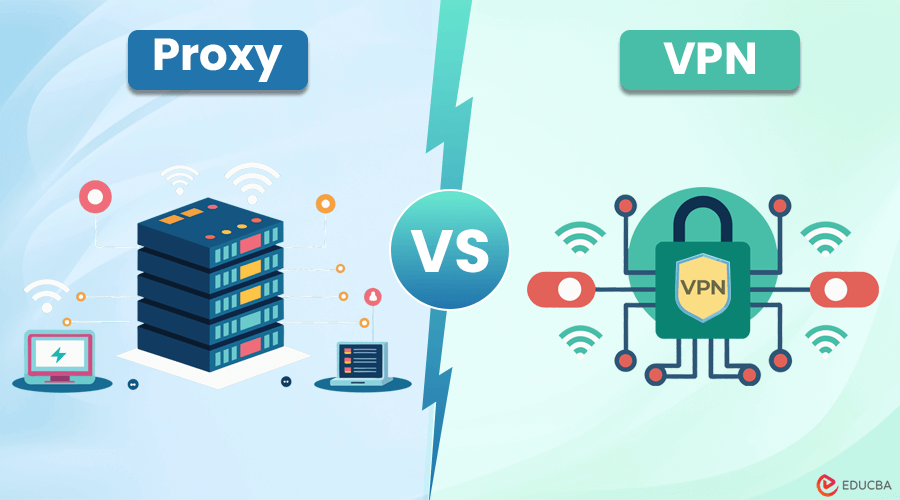Proxy vs. VPN – Introduction
Proxy and VPN are tools for enhancing online privacy and security, but they work slightly differently. In this Proxy vs VPN article, we will look at how they are different from each other.
First, let’s understand what proxy and VPN mean.
A proxy functions as a middleman between a user’s device and the internet, facilitating communication between them. The proxy server routes your device’s requests through it before they reach the destination website or service. This can hide your IP address and encrypt your data, providing privacy and security. They are generally less expensive than VPNs and have various subtypes and categories, such as a cheap mobile proxy, a residential one, or a server hosted in a data center.
On the other hand, a VPN is a technology that establishes a protected and encrypted connection across an otherwise unsecured network, like the internet. When you use a VPN, your device connects to a remote VPN server through an encrypted tunnel. This masks your IP address and encrypts your internet traffic, providing more privacy and security than a proxy. VPNs are more expensive than proxy services.
In this Proxy vs VPN article, we will look at how they are different from each other.
Proxy vs. VPN
| Aspect | Proxy | VPN |
| Purpose | Provides a secure, encrypted connection for privacy and security. | Allows users to direct their internet traffic through a designated server to conceal their IP addresses. |
| Encryption | Encrypts the entire internet connection, including all data sent and received. | Encrypts only the traffic between the user and the proxy server. |
| Security | Offers higher security by encrypting data and masking IP addresses. | Offers limited security as it only masks the IP address and doesn’t encrypt data. |
| Anonymity | Enhances anonymity by concealing both the IP address and data. | Offers basic anonymity by hiding the IP address but not the data. |
| Speed | May slow down internet speed due to encryption and routing through VPN servers. | Generally faster than VPNs since it only reroutes traffic through a single server. |
| Usage | Ideal for accessing geo-restricted content, enhancing online privacy, and securing data on public networks. | Commonly used for bypassing geo-restrictions, accessing blocked websites, and hiding browsing activities. |
| Setup | Typically requires installation of VPN software or manual configuration on devices. | Can be set up through browser settings or by configuring network settings on devices. |
| Reliability | Generally more reliable in terms of connection stability and uptime. | Reliability varies depending on the quality and availability of proxy servers. |
| Legal Considerations | Legal to use in most countries, but usage for illegal activities is prohibited. | Legal to use in most countries, but some jurisdictions may restrict or regulate their usage. |
Side-by-Side Advantages of Proxies and VPNs
Proxies:
- Speed: Proxies can improve internet speed by storing commonly accessed resources, which reduces the time needed to retrieve data from the web. This is particularly beneficial in settings such as offices or schools where multiple users access similar content, as caching can notably enhance browsing speeds.
- Cost-effectiveness: Proxies tend to be more budget-friendly than VPNs, making them an attractive option for individuals and businesses requiring basic IP masking and access to geo-blocked content without the need for robust encryption. Proxies, such as mobile proxies and residential proxies, allow for precise management of specific applications or types of web traffic, offering detailed control over network traffic. This affordability can benefit smaller organizations or individuals with limited resources.
- Simplicity: Setting up and using a proxy is typically straightforward, making it accessible to users who may not require the advanced security features provided by VPNs. This simplicity reduces the barriers to entry, making proxy solutions accessible to users of all levels, from beginners to experts.
- Targeted application use: Proxies allow for precise management of specific applications or types of web traffic, offering detailed control over network traffic. This targeted approach allows users to optimize performance for specific tasks or applications, such as content filtering, without the overhead of encrypting all network traffic. It is a flexible solution that enables efficient resource allocation and management within a network infrastructure.
VPNs:
- Comprehensive Security: VPNs encrypt all data transmitted and received by a device. This encryption is particularly crucial when using insecure networks like public Wi-Fi, as it protects against cyber threats like eavesdropping and hacking.
- Total Privacy: VPNs ensure your online activities remain private by masking your IP address and encrypting your internet connection. This privacy is vital for maintaining confidentiality and safeguarding sensitive online transactions.
- Universal Application: Unlike proxies, which may only affect traffic from specific applications, VPNs secure all traffic from the device. This universality means that regardless of which applications you are using, all your data is protected, providing a comprehensive layer of security.
Final Thoughts
Proxy and VPN offer online privacy and security solutions. Proxies provide simplicity and speed, acting as intermediaries and masking IP addresses but lacking encryption. On the other hand, VPNs offer robust encryption, ensuring data security and privacy. Their choice relies on individual preferences for speed, security, and anonymity. While proxies may suffice for basic browsing needs, VPNs offer a comprehensive solution for users seeking enhanced privacy and protection online.
Recommended Articles
We hope this article on “Proxy vs VPN” was helpful to you. To learn more, refer to the articles below.


